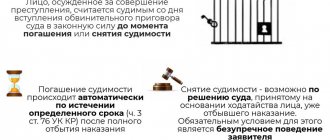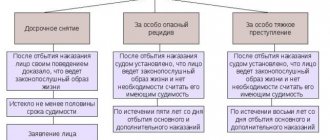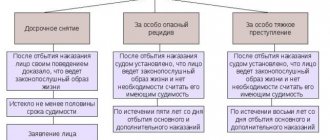The difference between removing and extinguishing the walker
Removal and expungement of a criminal record - what is the difference? The similarity of meanings is obvious - we are talking about getting rid of restrictions caused by a criminal record. Both options for avoiding consequences are impossible when the penalty is being served. Differences in concepts are established by Art. 84, 85, 86 CC:
- Part one art. 86 - repayment is the automatic end of the period of the criminal record procedure upon termination of the period fixed by law. No special regulations are required in this regard.
- Art. 84 - early withdrawal under amnesty, Art. 85 - in connection with the pardon. Shares are carried out by court decision.
- Part 5 art. 86 takes into account the elimination of a criminal record in order to reward the convicted person for good behavior. If a citizen released from prison has no violations of the regime, the consequences will be removed from him ahead of schedule.
In the latter case, to initiate the process, you need to submit a petition to the court, whereas when expunging a criminal record, the action occurs automatically.
If at the hearing it is revealed that the applicant was brought into custody while a sanction for an offense was in effect, the court will not agree with the early expungement of the criminal record.
Types of criminal record expungement
A criminal record can be expunged in the following ways:
Early repayment
Early repayment on the basis of a petition submitted to the court by a convicted person who has already served his sentence (Article 400 of the Code of Criminal Procedure).
If a citizen behaved impeccably after serving his sentence for a crime and compensated for the harm caused by his offense, the court may satisfy his request to have his criminal record expunged before the expiration dates established by law.
To have a criminal record expunged in this manner, a citizen who has served his sentence must prepare a petition and submit it to the judicial authority at his place of residence.
The court considers the petition and makes a decision to remove the criminal record early or to refuse to consider the petition.
In the second case, the citizen has the right to submit the application again.
Pardon
As a result of pardon (Article 85 of the Criminal Code). A pardon is an act of goodwill by the President in relation to specific individuals.
On the basis of a pardon, a citizen can be released from further serving a sentence, and the imposed punishment can be replaced with a more lenient one.
Also, on the basis of a pardon, a citizen who has already served his sentence may have his criminal record expunged early.
To be released on the basis of a pardon, a citizen submits a corresponding petition.
The document is considered by a special commission on pardons established on the territory of a constituent entity of the Russian Federation.
The commission consists of at least 11 people. Respected citizens with a positive reputation and having a higher education can become members of the authorized body.
From the moment the commission receives the petition, within 30 days a decision must be made on the advisability of applying an act of pardon in relation to a specific citizen. The commission's conclusion is submitted for approval to the highest official of the constituent entity of the Russian Federation.
When considering the issue of pardon, the nature of the crime committed, the behavior of the convicted person during imprisonment, compensation for the harm caused, the marital status of the convicted person, etc. are taken into account. . Amnesty
Amnesty
As a result of the amnesty (Article 84 of the Criminal Code).
Amnesty is a legislative act of the State Duma applied to certain groups of citizens, and not to individuals.
On the basis of an amnesty, convicts can be released from criminal liability and punishment. Also, as a result of the amnesty, the imposed punishment is replaced with a more lenient one, and citizens who have served their sentences have their criminal record expunged early.
After the Duma adopts the document and enters into legal force, all persons covered by the amnesty receive appropriate written notifications.
The execution of the procedure is entrusted to various authorized bodies depending on the stage of proceedings in a specific criminal case (courts, investigators, administration of colonies and detention centers, etc.).
These bodies issue an amnesty resolution, which is approved by the prosecutor.
The use of an amnesty is allowed only in combination with carefully thought-out measures of social support for amnestied citizens (control over their behavior, assistance in solving everyday issues, taking measures to assist in employment and socialization in society, etc.).
The concept of an expunged criminal record
What does an expunged criminal record mean in Russia?
Art. 86 of the Criminal Code (Criminal Code of the Russian Federation) determines that a citizen is considered to be convicted from the moment the sentence enters into force until the removal or repayment of the punishment - getting rid of this status.
After losing a criminal record, all restrictions provided for by law are lifted from a person.
These are the prohibitions:
- hold separate positions in the civil service and law enforcement agencies;
- carry out pedagogical activities in relation to minor children;
- work as a lawyer and manage the financial sector;
- engage in aviation security, security and private investigation.
An existing criminal record must be indicated when filling out significant documents from various institutions.
Until the repayment period, former prisoners are supervised. Unpaid consequences aggravate the life circumstances of the citizen.
Grounds and reasons for getting rid of a criminal record
The removal of previously assigned criminal records from convicted persons is provided for by the rules of modern legislation and must be carried out within a strictly established time frame. This condition is stated in Art. 86 of the Criminal Code of the Russian Federation.
But there are certain situations when a criminal record can be expunged before the end of the term. In such a situation, you need to write an appropriate petition.
Early expungement of a criminal record is permitted in the following situations:
- The punished person has already served the prescribed sentence, but the convicted conviction erroneously turned out to be outstanding;
- The citizen has an exceptionally positive character, both at home and at work;
- The accused has not previously been found to have committed any other violations, and at work he fulfills his duties conscientiously and without any criticism;
- The requirements and obligations imposed by the court have been fulfilled;
- The person visits the penitentiary inspectorate within the specified time frame;
- The citizen admitted his guilt and completely repents of his offense.
Differences
How does expungement of a criminal record differ from expungement?
These legal procedures differ for the following reasons:
- Expungement of a criminal record occurs automatically as a result of the end of the sentence established by the court for an offense committed by a citizen.
For repayment to occur, a citizen does not need to take any measures or submit any documents to law enforcement agencies. The expungement of a criminal record is a special procedure for early change of the terms during which the legal consequences of a committed offense apply. A criminal record is cleared only after certain procedures are carried out in the form of filing a petition in court, issuing a pardon or an amnesty. - Repayment is allowed only after the expiration of deadlines strictly regulated by law. Withdrawal can be made after the expiration of 50% of the period allotted for repayment, but this setting is based on generally accepted judicial practice and is not enshrined in law.
Both repayment and withdrawal allow a citizen to completely get rid of the legal consequences of the offense he committed. In both cases, the criminal record is annulled.
Documents attached to the application
Along with the application to the court, the following must be submitted:
- certified copies of the verdict and decision of the higher court;
- certificate of the duration of the sentence served;
- arguments of relatives, friends, acquaintances, neighbors, expressed by them personally or in writing;
- characteristics issued at the educational institution, by the immediate supervisor from the place of work and in other places;
- copies of incentive orders (if any);
- a certificate drawn up by the district police officer at the place of residence stating that there are no complaints against the convicted person;
- written confirmation that the convicted person has not committed new crimes while serving his sentence;
- a certificate from a medical institution about the disease, if any;
- a certificate confirming the payment of a sum of money as compensation for damage, if any.
When considering the application, other documents may be requested.
Something is not clear? and get expert commentary
Restrictions imposed by a criminal record
Although the fact of a criminal record is confidential information, it imposes certain restrictions on a person’s future activities. Having a criminal record does not allow:
- obtain a position in state administrative bodies (cadastre, mayor's office, etc.);
- in law enforcement agencies (FSB, Ministry of Internal Affairs, courts, security company, etc.);
- study at some universities (for example, at the Faculty of Law),
- restriction of rights to purchase and store weapons;
- travel outside the country on a visa;
- move freely around the country, serve in the Army;
- cannot be hired by some enterprises, institutions and organizations, including government, educational and others.
A criminal record also interferes with employment in educational institutions, children's educational and development centers.
What is an expunged criminal record?
The expungement of a judicial sentence is the end of the period of time established by the court for a crime committed by an individual or legal entity. After the designated period has passed, the citizen ceases to have a criminal record.
The provisions of the Criminal Code of the Russian Federation provide for two ways to get rid of a criminal record:
- Removal;
- Redemption.
According to criminal law, when a court sentence is extinguished, certain consequences caused by it are canceled.
Automatic expungement of a criminal record occurs in the following cases:
- After one calendar year has passed, after a non-custodial sentence has been executed;
- In the event of a specific period of time after the release of an individual or legal entity from the place of imprisonment (the period of repayment of the court sentence depends on the category of the crime committed by the perpetrator);
- Upon completion of the trial period.
Removal of a judicial imprisonment is the early release of an individual or legal entity from the consequences caused by it. The removal of a criminal record by a judicial institution is carried out on the basis of a submitted petition. Having considered the indicated petition, the court makes a decision to remove the criminal record. The fundamental role that influences the positive outcome of the decision of the judicial institution in the presented issue is played by materials that give the convicted individual or legal entity a positive characteristic and confirm that the main goal of the punishment was achieved - the correction of the convicted person. The deterioration of the health of an individual or legal entity may also become a reason for making the indicated decision. In the presented situation, the convicted person is required to provide medical documents confirming this fact.
It is important to note: if the court finds that a convicted individual or legal entity was held criminally or administratively liable during the criminal record, then it has the right to refuse the guilty person to remove the judicial conclusion before the deadline established by law. . Amnesty also removes criminal record
An amnesty also removes a criminal record.
A convicted legal entity or individual who is released from serving a suspended sentence established by the court is convicted until the suspended sentence is in effect.
It is important to note: if a convicted person was released from a previously established punishment, as a result of which the offender did not serve it, then he cannot be considered a convicted person. As mentioned earlier, the concepts of “conviction” and “conviction” differ from each other, therefore, if the court passed a sentence, but no punishment was imposed due to the fact that the statute of limitations had expired or an amnesty was applied, then the convicted person is either physically or legally the person will not be considered to have been convicted, even if a preliminary conclusion was issued.
Certificate of expungement of criminal record
A certificate is a document that reliably confirms the removal or expungement of a particular person’s criminal record. It even indicates the end date of the criminal record.
So, let's look at where to get a certificate of criminal record expungement. This document can be issued by the territorial body of the Ministry of Internal Affairs or the Federal Institution “GIAC of the Ministry of Internal Affairs of the Russian Federation”. In order to receive it, a person must provide the following documents:
- relevant statement;
- photocopy of passport;
- passport or other identification document.
Download the application for a criminal record certificate
The application can be written directly to the authority that issues such certificates. The application form was approved by Order of the Ministry of Internal Affairs No. 1121 of November 7, 2011. It states:
- name of the body to which the application is addressed;
- information about the applicant: full name, address, telephone;
- request to provide information about the presence or absence of a criminal record in relation to a specific person (when changing the name or surname, the application must also indicate old information indicating the date of change of name or surname).
How to get a certificate through the State Services website - watch the video:
https://youtube.com/watch?v=heIW_3bWVuY%3Fautohide%3D2%26autoplay%3D0%26controls%3D1%26fs%3D1%26loop%3D0%26modestbranding%3D0%26playlist%3D%26rel%3D1%26showinfo%3D1% 26theme%3Ddark%26wmode%3D
Only a previously convicted person can obtain such a certificate.
It should be noted that the requirement of such a certificate on the part of the employer will be illegal, however, an applicant for a job can, if he wishes, provide such a document in order to increase his chances of getting a position.
Want more information? Ask questions in the comments
Procedure
The Code of Criminal Procedure explains the rules for considering a petition to expunge a criminal record. Brief algorithm:
- sending the paper to the judicial authority involved in criminal cases;
- after the court receives the paper, a date for the hearing will be set;
- during the review, not only the necessary documentation will be taken into account, but also various evidence of good behavior, including in the form of a conversation with a citizen;
- the position of the prosecutor and other persons is heard;
- making a decision to refuse or satisfy the application.
In the event of a negative court decision, such a paper may be resubmitted only 12 months after the last consideration of the case.
A criminal record is cleared if the necessary papers and documents confirming the appropriate behavior of the citizen are available for consideration of the issues. Among them:
- a sentence describing the crime committed by a person;
- paper confirming the completion of the established sentence;
- a certificate from the local police officer about the citizen’s good behavior during a certain period of time;
- a paper indicating the fact that the person was not brought to administrative (meaning payment of a fine or otherwise), as well as other liability after the punishment suffered;
- characteristics from the organization in which the citizen works.
Testimony from witnesses, if any, will be heard. They have the right to be relatives, neighbors, etc.
In what order is the application considered?
In accordance with Art. 400 of the Code of Criminal Procedure of the Russian Federation, a petition filed by a convicted person or his lawyer must be considered by a court or magistrate in the area where the citizen lives. He himself must necessarily take part in a meeting at which the issue of early expungement of his criminal record will be decided. If the citizen fails to appear in court, the court hearing is subject to cancellation.
A person interested in having his criminal record expunged must independently take care of collecting the necessary evidence. They usually use documents such as:
- duly certified copies of court verdicts, decisions, rulings, including those adopted at the stage of appeal, cassation or in the course of supervision;
- certificates confirming that the sentences imposed on the convicted person have been served or executed;
- copies of orders on the application of incentive measures from the place of work;
- characteristics issued by the organization or educational institution in which the citizen is employed or undergoing training;
- papers confirming that the damage caused by the crime has been compensated;
- a certificate from the Ministry of Internal Affairs confirming a criminal record and administrative liability;
- a certificate of the citizen’s behavior at the place of residence, obtained from the district police officer.
If there are no documents required for an objective consideration of the application, the court has the right to request them independently.
The prosecutor is notified of the receipt of the petition. He is also entitled to take part in the hearing, but the court can consider the application of the convicted person without his participation.
The hearing begins with the court, after a brief report on the merits of the case, giving the floor to the citizen who filed the petition. He can give his explanations on the essence of the issue under consideration. Then the judges begin to examine the presented materials, provide the opportunity for the prosecutor (if present) and other persons who have received an invitation to the trial to speak.
If the decision is not made in favor of the applicant, he will have the opportunity to re-file the application on the same grounds only one year from the date on which the decision to refuse was adopted. But it can be challenged on appeal.
Example
So, S.V. by the verdict of the Volgograd Garrison Court he was convicted of abuse of power and fraud under Part 1 and Clause “c” of Part 3 of Art. 286 of the Criminal Code of the Russian Federation, as well as under Part 3 of Art. 119 of the Criminal Code of the Russian Federation. He received 3.5 years in a penal colony and was stripped of the rank of major general. Then the Presidium of the North Caucasus District Military Court reviewed the case, recognizing S.V. guilty only under paragraph “c” of Part 3 of Art. 119 of the Criminal Code of the Russian Federation. The term of imprisonment was reduced to 3 years and 3 months. A few months later, the place where the sentence was served was changed to a colony-settlement. Soon S.V. was released on parole. The unserved term was 1 year 8 months.
After the end of the probationary period, more than ½ of the period had passed before the expiration date of the criminal record, he filed a petition for its early removal. S.V. received a refusal, against which he filed an appeal. He referred to the fact that the court's decision was not motivated. In particular, it was not taken into account that S.V. compensated for the damage caused, got a job at a search and rescue station in a leadership position and personally saved 7 people. The court had no evidence that the citizen’s behavior could not be considered impeccable. As a result, the decision made by the previous instance was canceled, and the petition of S.V. – satisfied (appeal ruling of the Moscow City Court dated September 17, 2021).
Procedure for expunging a criminal record by petition
Applications for withdrawal are submitted:
- The convicted person, his representative.
- An inspector supervising a person on probation.
The following is submitted to the judicial authority for consideration of the case:
- submission submitted by the supervisory inspector;
- The petition is drawn up personally in free form according to the provided sample, but it is better to involve a lawyer for this.
Within ten days, these documents are considered by the court.
If the submitted documentation is drawn up correctly, it includes the necessary information, does not contain offensive language, and the deadlines for the request are met, then it is possible to accept the case for proceedings, where:
- The applicants' appeal to the court is heard.
- Documents are attached to the case.
- The evidence provided is studied and analyzed.
- A representative of the prosecutor's office is heard.
- The witnesses listed in the attached papers are being interviewed.
After which the court makes a decision and draws up a resolution.
Expungement of a criminal record with a suspended sentence
The expungement of a criminal record before the expiration of the probationary period, a suspended sentence in accordance with Article 74 of the Criminal Code, is used as an incentive measure for persons who have realized their unlawful behavior and have proven correction. The latter can be expressed in:
Additional information The minimum suspended sentence is six months. The maximum is 3 years if the convicted person is sentenced to less than a year of the main sentence, and 5 years if the sentence is more than a year. Read more about the consequences and restrictions associated with a suspended sentence.
- good behavior during the probationary period;
- conscientious work or study;
- compensation for harm to the victim;
- accurate fulfillment of the duties assigned by the court during the probationary period;
- no offenses.
A criminal record must be expunged if 2 conditions are simultaneously met:
- At least half of the probation period determined by the court has passed.
- The authorities monitoring the behavior of the convicted person send a request to the court to remove the criminal record.
The last paragraph distinguishes the procedure for removing a criminal record from a person who has served his sentence and is on probation. Persons who have served their sentence can independently initiate the expungement of their criminal record by filing an appropriate petition.
Clearance of a criminal record
There is only one single way to completely clear a criminal record from the database and its rules will be described in the first section. There are no other ways! However, there is one partial one, and we will dwell on it in detail.
Basic Law on Criminal Records
Let's start with the basic law on criminal records (Article 86). To get you up to speed, I will introduce you to parts 3, 4 and 5 “on expunging a criminal record” using information directly from the source.
Conditional release. A criminal record is automatically expunged after the probationary period.
Conviction in a mild form of punishment, instead of imprisonment. The convicted person undergoes the full punishment, after which he must wait one full year, the criminal record will be automatically expunged. N 162-FZ.
When the severity of the crime does not exceed average. A criminal record is cleared after three full years have passed after the sentence has been fully served.
When the severity of the crime is assessed as grave. The criminal record will be vacated after eight years have passed from the completion of the sentence. N 218-FZ.
The crime is assessed as particularly serious. A criminal record is removed after ten full years from the date of serving the sentence. N 218-FZ.
Convicts released early from serving their sentences in a place appointed by the court or part of their term were replaced by probation. The starting point for the expungement of a criminal record occurs when the actual time served, together with additional work, is considered completed.
A criminal record can be vacated if the convicted person, after serving his sentence, has shown himself to be impeccable and has necessarily compensated for all the damage caused by the crime.
As you can see, clearing your criminal record from the database is completely easy, but waiting for many years is, to put it mildly, inconvenient. There is a way to bypass this rule, which is called a “temporary certificate of no criminal record.” I repeat once again, this will not clear the criminal record from the database, but will simply help “outwit” it.
certificate of good conduct
It is a document that temporarily removes your criminal record.
The certificate indicates that you have no criminal record or involvement in criminal liability. Citizens of Russia receive it for the purpose of presentation to government agencies. Valid from one to three months. The exact validity period of the certificate will depend on which government agency it will be presented to. If it is necessary to travel abroad, the certificate is issued for three months. In all other cases, the period is set by the issuing institution.
How to remove a criminal record from the database?
The question of how to remove a criminal record from the database worries many citizens who face difficulties in finding employment. With the introduction of information technology, criminal records are stored forever. Even if a criminal record is expunged and a person is legally considered not to have a criminal record, it is almost impossible to remove a criminal record from the Ministry of Internal Affairs database.
Important
Proposals to remove information about a criminal record from the database of the Information Center of the Ministry of Internal Affairs of the Russian Federation through a certain fee are a scam.
To remove a criminal record from the database, it will not be enough to expunge the criminal record or wait a certain time, since the information is stored for life, because there is a risk of the offender reoffending. This means it is important to know whether a particular person has been previously convicted. Moreover, the database in the Russian Federation is common to everyone, so moving to another city will not help. It is possible to remove a criminal record from the database only in cases where a mistake was made by authorized employees or the court acquitted the citizen. Only if you have one of these grounds, will you be able to get rid of the label of criminal prosecution.
This is also important to know:
Expungement of criminal records in 2021
To find out how to remove a criminal record from the Ministry of Internal Affairs database, it is important to familiarize yourself with the procedure:
Expungement of a criminal record through the court: contact the court with an application (Chapter 25 of the Code of Civil Procedure of the Russian Federation). It is important to point out that:
- the need to process personal data has disappeared;
- processing of personal data violates constitutional rights;
- the processing of personal data has no legal basis;
- The Ministry of Internal Affairs cannot ensure the confidentiality of personal data.
When going to court, you must prove all of the above points. It is almost impossible to do this without the help of a professional lawyer, so we advise you to find a good lawyer who can protect your rights in court and achieve the desired result.
Who practically tried and what happened.
In judicial practice there are a lot of cases that ended in the refusal of the applicant to satisfy his demands.
Example 1. Case No. 2-1406/2011. Citizen Yagodkina I.I. appealed to the court with a request to remove information regarding her from the database. In her statement, she indicated that the prosecution for the act she committed was terminated, although she never received the prosecutor's order. The court, having studied the case materials, came to the conclusion that it was impossible to remove information from the GIAC, since the parties did not deny the fact of committing a crime. The court explained that termination of proceedings on non-exonerating grounds is not a reason to destroy data from the system.
Example 2. Case No. 2-4962/2013. Citizen Miller N.V. appealed to the court with a demand to remove information about him from the GIAC of the Russian Federation because he considers the storage of information discrediting him illegal. From the case materials it is obvious that the applicant was convicted, served his sentence, and had his conviction expunged. The court refused to satisfy the applicant's demands, indicating in the decision that the information entered the database legally, so its exclusion was not provided for.
Other examples can be given.
Next, we will consider the court decisions taken in favor of the applicants.
Example 1. Case No. 2-7330/2011 ~ M-7113/2011. Semenov N.P. It was possible to prove that information about the crime he allegedly committed got into the database by accident; a criminal case was never opened against him. Since the materials had already been destroyed, and the police confirmed the fact that no case had been opened, the court ordered the authorized body to delete information about N.P. Semenov. from GIAC RF.
Example 2. Case No. 2-604/2011 ~ M-267/2011. Shamsutdinov N.R. won the argument because he proved that he knew nothing about the fact that an investigation was being carried out against him. Since the case materials were destroyed and cannot be restored, the court decided to satisfy the requirements to remove information from the GIAC of the Russian Federation.
Example 3. Case No. 33-2621/2011. Sheremetyev V.M. committed a crime that ended in the reconciliation of the parties in a private prosecution case. The applicant asked the court to remove information about the crime from the database, since the proceedings ended on exonerating grounds. The court satisfied the demands of V.M. Sheremetyev. Information about him was indeed subject to removal from the database.
Thus, it will only be possible to remove information from the RF GIAC database if it is located there illegally.
Features of expunging a criminal record in the case of decriminalization of an act
Decriminalization of an act means that it has ceased to be considered a crime and no longer poses a public danger, and therefore it was excluded from the Criminal Code of the Russian Federation. This circumstance must be taken into account by the court. If the proceedings are already underway, they must be terminated, since there is no corpus delicti in such a situation. Simultaneously with the refusal to prosecute a citizen, the court removes his criminal record.
In cases where the convicted person has already served his sentence for a decriminalized act, there is no need to file a petition with the court. Expungement of a criminal record will occur automatically on the day when the amendments made to the Criminal Code of the Russian Federation come into effect.
But it is worth considering that after a criminal record is cleared based on the decriminalization of a criminal article, a citizen will still be considered a former convict. Information that he previously had a criminal record will continue to be stored in the databases of the Ministry of Internal Affairs. A review of a sentence in accordance with the position of the Supreme Court of the Russian Federation can be carried out only before the expiration of the criminal record or its removal.
General rules for expunging and expunging a criminal record
Article 86 of the Criminal Code of the Russian Federation establishes the following terms of criminal record (after which a person is considered unconvicted) for those who have committed crimes of varying severity:
- 1 year for those sentenced to any punishment other than imprisonment (fine, correctional labor); Example: a certain Ivanov for systematically beating his own wife was sentenced to a year of correctional labor at the beginning of May 2010. A year later, in 2011, Ivanov served his sentence punishment. And a year later - in May 2012 - this citizen was already considered not to have a criminal record.
- 3 years after the person is still listed as a convicted person when he is sentenced to imprisonment for a crime of minor or medium gravity (up to 2 years in the first case and up to 5 in the second); Example: citizen Tokarev committed a bag robbery women (without the use of violence), was caught and sentenced for this crime of medium gravity to 2 years in prison. Having served his sentence, Kiselev was released in January 2021. And he will be considered not convicted in January 2021.
- 8 years, when the court imposes a sentence of imprisonment for serious crimes (beatings with serious consequences for the victim; major thefts; illegal possession of weapons, drugs; fraud; rape, etc.); Example: Lukin, convicted of robbery, received 6 years in prison. He was released from the colony on December 20, 2013, having fully served his sentence. Thus, his criminal record will be expunged on December 20, 2021.
- 10 years, if the court sentences the offender to imprisonment for a particularly serious criminal offense (murder; serious bodily injury resulting in death; robbery; large bribes; sale of drugs in significant and large quantities, etc.). Example: for sale of weapons and other criminal acts, a certain Pavlov was sentenced to 12 years in prison on March 21, 2003. Having served his sentence “from bell to bell,” citizen Pavlov was released on March 21. 2015. And his criminal record will be cleared only on March 21, 2025.
A separate line in the law provides for the expungement of criminal records from probationers. If the court has assigned a suspended sentence to a defendant for some crime, then after serving this term in full (with excellent behavior, working and regularly reporting to the local IIN), he will be considered by law to have no criminal record.
Example: citizen Olenev inflicted moderate bodily injuries on citizen Ukhov during a fight. Taking into account the positive characteristics of Olenev and the unlawful behavior of the victim Ukhov (inciting a fight with an insult), the court gave Olenev a suspended sentence (2 years) in September 2014. Having served his sentence in full and without any complaints, Olenev began to be considered not convicted immediately - in September 2021.
In reality, of course, not everything is so smooth. If Olenev, for example, while serving his suspended sentence, had committed a new crime or violated the established regime of serving, the terms of expungement of his criminal record would have been calculated accordingly differently.
What deadlines must be met to go to court?
The Criminal Code of the Russian Federation defines only the deadlines for automatic expungement of a criminal record.
They depend on the severity of the crime and the punishment imposed. The legislation does not say anything about how long after a criminal record can be expunged at the request of a citizen ahead of schedule. However, from Part 5 of Art. 86 of the Criminal Code of the Russian Federation it follows that a convicted person can count on the satisfaction of a submitted petition if he has proven by his behavior that he has reformed. The fact of correction can be certified only after some time has passed after the execution or serving of the sentence.
Obviously, the length of the period of correction of a convicted person depends on the severity of the act he committed. As a rule, the court accommodates the applicant if, at the time of filing the petition, at least half of the term of the criminal record provided for its expungement has expired.
So this means that:
- with a suspended sentence of a citizen, ½ of the probationary period was left behind;
- if the convicted person was not sentenced to imprisonment, six months have elapsed from the day the punishment was carried out;
- one and a half years have passed since the completion of the sentence for an act of minor or moderate gravity;
- 4 years have passed since serving a sentence for a serious crime;
- at least 5 years have passed since the end of punishment for a crime recognized as particularly serious.
In certain situations, taking into account the personality characteristics of the convicted person, the nature of his crime and data on his behavior, the court may remove a citizen’s criminal record earlier than the deadlines specified here.
How to check your criminal record
Please note: Expungement of a criminal record is its early cancellation as a result of the adoption of a special court decision, while expungement of a criminal record occurs automatically after a certain period. We will tell you more about each case
. It is not easy to check another person's criminal record.
Calculating the duration of a criminal record will not provide a guaranteed answer to the question, since the other person may not know exactly when the additional sentence was fully served. In addition, a former convict has the right to have his criminal record expunged through the court. This may happen earlier than the expungement dates listed above.
It is not easy to check another person's criminal record. Calculating the duration of a criminal record will not provide a guaranteed answer to the question, since the other person may not know exactly when the additional sentence was fully served. In addition, a former convict has the right to have his criminal record expunged through the court. This may happen earlier than the expungement dates listed above.
All information about persons who have previously committed a crime and served a sentence for it is stored in the database of the Main Information and Analytical Agency of the Ministry of Internal Affairs, to which only a limited number of law enforcement officials have access.
Databases available on the Internet cannot guarantee the accuracy of the information provided. However, there are several ways to find out about another person’s criminal record:
Official website of the court
You should go to the court website located in the area of residence of the person you are interested in. Next you should find the section “judicial paperwork”, and in it - the search period. The system will prompt you to find information by last name. In this way, you can find out whether there are pending cases against a particular person. However, this method also does not provide a 100% guarantee, because the person could have been convicted by another court.
Bailiffs website
Another way to find out online whether a criminal record has been expunged is to search in the electronic database of bailiffs. Access to it is open to everyone, and the information is reliable and up-to-date. By last name you can find information about a person’s unpaid fines and alimony obligations.
Refusal to satisfy the application
There are several situations in which the described request will be refused:
- The application was submitted at a time that does not correspond to that specified in the law.
- The document contains errors or inaccuracies in information.
- Throughout the entire probationary period, certain legal violations were committed.
- The information in the petition is unclear and there is a complete absence of supporting documents.
If the decision is not made in favor of the applicant, the period of criminal record automatically remains the same. It is only possible to submit a new application after one year.
An expunged criminal record is a 100% guarantee that a person will be given back all their constitutional rights.
It must be remembered that information about previously incurred criminal punishment will still be stored in the Internal Affairs Directorate.









